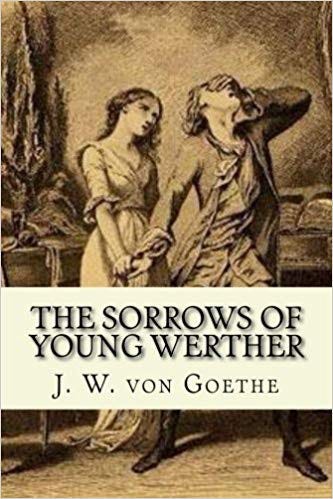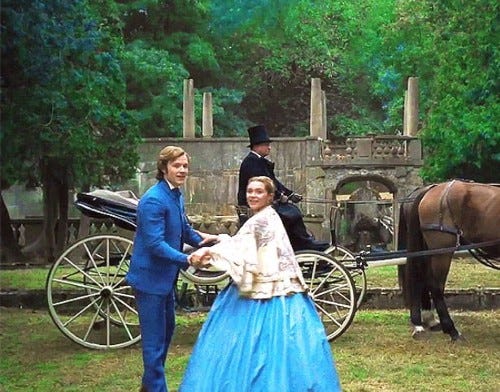Why Jo and Laurie Don´t End Up Together, Transformative Power Of Love
and how the film makers like to ignore it
Laurie as the Goethean Protagonist
Trigger warning there will be mentions of suicides.
What it comes to Laurie´s character arc there are lots of themes that come straight from Goethe´s writings. Goethe´s first financially successful novel (and first German international best-seller) The sorrows of Young Werther is a semi-biographical novel. Both protagonists young Werther and Goethe himself grew up the privileged same way as Laurie. Werther´s love interest Charlotte is marrying another worthy man Albert. Werther makes Charlotte the only sole purpose of his living. He is not only miserable. He is proud of his misery. In fact, he endorses it. As a result, he commits suicide. What kills Werther is not being disappointed in love. It has nothing to do with Charlotte. What kills him is his toxic self-centeredness. What is common with Werther and Laurie is that they are both extremely sensitive. Same way as Little Women the sorrows of young Werther has often been misread. Some readers endorsed and glamorised Werther´s suicide and when the book became vastly popular it started a wave of suicides of young people in Germany who tried to emulate the tragic end of their romantic hero.
“The children took especial interest in the love story, and when poor Laurie was so obstinately refused by Jo, “they wept aloud and refused to be comforted,” and in some instances were actually made ill by grief and excitement” (Cheney)
References to Goethe continue in Laurie´s proposal. After being rejected Laurie does threats to take his life and puts enormous pressure on Jo. Same way as with the sorrows of young Werther a great deal of Little Women fans, especially younger ones, find these worrying threats passionate and romantic. Goethe´s book was widely misunderstood since he meant it as a criticism and warning example towards life-consuming self-absorption.
“When I re-read the novel in my early twenties, I still technically thought Jo should have ended up with Laurie, but I started to feel uncomfortable about feeling that way. Wasn’t it weird, I thought, to feel that way when the character of Jo so explicitly rejected his proposal? Wasn’t it a bit like telling a dear friend she should date someone she wasn’t crazy about just because he had feelings for her and is such a good guy? I dismissed this though because a) death of the author, non-canonical pairings are a-ok, etc. and b) I have a moderate grasp on reality and I do recognize Jo is a fictional character, not my friend. But re-reading Little Women this month, I realized with mounting alarm that as a potential romantic partner for Jo, Laurie isn’t a good guy; he is, in fact, a Nice Guy™. […] The story of Laurie and Jo is not, as I had previously remembered, one of Jo seeming like she loves Laurie and making an out-of-left-field decision. It is very much in the field! Jo consistently indicates that she does not have feelings for Laurie, does not want him to flirt with her, and tries to prevent him from doing so every time he flirts with her. And he ignores her, again and again. But wait, there’s more! When Jo realizes that her very consistent attempts to communicate her disinterest are not working, she decides to move to New York for adventure and also to get away from Laurie. […] There may be some who would accuse me of selective reading. After all, Laurie isn’t a terrible person! […] To which I say: yes, but all of this can be true and Laurie can simultaneously still be a terrible potential partner for Jo. […] What I realized re-reading Little Women as a grown-ass adult is this: making Jo and Laurie perfect for each other wouldn’t just require a different ending, it would require an entirely different book. So, it’s been over twenty years in the making, but better late than never: Louisa May Alcott, I’m sorry. You were right.”
Maddie Rodgriguez, ‘Laurie Isn’t a Good Guy, He’s a Nice Guy™’ (bookriot.com)
Proof in the pudding:
As Goethe, when he had a joy or a grief, put it into a song, so Laurie resolved to embalm his love sorrow in music and to compose a Requiem which should harrow up Jo’s soul and melt the heart of every hearer. (Little Women, chapter 41)
In Wilhelm Meister´s Apprenticeship, there is also an important character called Friedrich (though he is a very different type of character than Friedrich Bhaer). One of the female characters, Marina, also likes to cross-dress (same way as Jo).
Wilhelm Meister´s Apprenticeship and Laurie´s redemption arc
Wilhelm Meister´s apprenticeship is a story about self-realisation. The story centres around Wilhelm who wants to escape the empty, mundane, bourgeois life of a businessman. After a failed romance he joins a theatre company. Wilhelm Meister´s apprenticeship and many of Goethe´s works, in general, have elements from Shakespeare´s plays. In fact in the novel´s dialogue there is a great deal of discussion about Shakespeare´s work and Wilhelm´s theatre group also performs a production of Hamlet where Wilhelm plays the lead. The Theatre world is filled with seductions, love affairs and scandals. The more Wilhelm sees it the more he dislikes it and he realizes that he is not fitting for this type of lifestyle. What Wilhelm really needs is to figure out who he is, what he wants from life and how he should live. Both Werther and Wilhelm can be seen as a failed geniuses. They are sensitive and artistic but they are not creatively productive enough. Laurie, in this case, is more similar to Wilhelm because unlike Werther Laurie goes through the process of self-discovery and like Wilhelm Laurie also becomes a husband and father (which brings long-desired purpose to his life) and a contributing member of the society which is not something he was before.
Wilhelm Meister´s apprenticeship introduces the character of Mignon. Mignon was kidnapped as a child by bandits and Wilhelm saves her. They tour the country together with the theatre group, go to picnics, flirt and joke with each other. Mignon has a constant longing for her homeland Italy. She falls in love with Wilhelm but he is in love with someone else. Eventually Mignon dies for longing (a common theme in Goethe´s works).
“It’s a genius simmering, perhaps. I’ll let it simmer, and see what comes of it,” he said, with a secret suspicion all the while that it wasn’t genius, but something far more common. Whatever it was, it simmered to some purpose, for he grew more and more discontented with his desultory life, began to long for some real and earnest work to go at, soul and body, and finally came to the wise conclusion that everyone who loved music was not a composer. Returning from one of Mozart’s grand operas, splendidly performed at the Royal Theatre, he looked over his own, played a few of the best parts, sat staring at the busts of Mendelssohn, Beethoven, and Bach, who stared benignly back again. Then suddenly he tore up his music sheets, one by one, and as the last fluttered out of his hand, he said soberly to himself…
“She is right! Talent isn’t a genius, and you can’t make it so. That music has taken the vanity out of my as Rome took it out of her, and I won’t be a humbug any longer. Now, what shall I do?”
The purest form of love is to love the full reality of the other person.
She did not hear him cross the courtyard beyond, nor see him pause in the archway that led from the subterranean path into the garden. He stood a minute looking at her with new eyes, seeing what no one had ever seen before, the tender side of Amy’s character. Everything about her mutely suggested love and sorrow, the blotted letters in her lap, the black ribbon that tied up her hair, the womanly pain and patience in her face, even the little ebony cross at her throat seemed pathetic to Laurie, for he had given it to her, and she wore it as her only ornament. If he had any doubts about the reception she would give him, they were set at rest the minute she looked up and saw him, for dropping everything, she ran to him, exclaiming in a tone of unmistakable love and longing…
Is it possible that anyone who has not been happy with the books has been looking at both Laurie and Friedrich from the completely wrong perspective?
“Throughout his many works, Goethe stresses love as the foundation of relationships, and he did so living in a culture where marriage matches were typically determined by economic factors. It was a radical position to take.
The difference between “You love me!” and “You love me?” The substitution of a question mark for an exclamation point “changes the meaning completely” (Gustafson).







